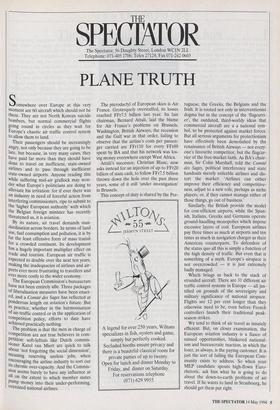The Spectator, 56 Doughty Street, London WC1N 2LL Telephone: 071-405
1706; Telex 27124; Fax 071-242 0603
PLANE TRUTH
Somewhere over Europe at this very moment are 60 aircraft which should not be there. They are not North Korean suicide bombers, but normal commercial flights going round in circles as they wait for Europe's chaotic air traffic control system to allow them to land.
Their passengers should be increasingly angry, not only because they are going to be late, but because, in very many cases, they have paid far more than they should have done to travel on inefficient, state-owned airlines and to pass through inefficient state-owned airports. Anyone reading this while suffering mid-air gridlock may won- der what Europe's politicians are doing to alleviate his irritation: for if ever there was an industry in need of forceful action from interfering commissioners, ripe to submit to the 'higher European authority' with which the Belgian foreign minister has recently threatened us, it is aviation.
By its nature, air travel demands stan- dardisation across borders. In terms of land use, fuel consumption and pollution, it is by far the least offensive form of mass transit for a crowded continent. Its development has a hugely important multiplier effect on trade and tourism. European air traffic is expected to double over the next ten years, making the inadequacies of airlines and air- ports ever more frustrating to travellers and ever more costly to the wider economy.
The European Commission's bureaucrats have not been entirely idle. Three packages of liberalisation measures have been enact- ed, and a Comite des Sages has reflected at Ponderous length on aviation's future. But in practice, whether in the harmonisation of air-traffic control or in the application of competition policy, efforts to date have achieved practically nothing. The problem is that the men in charge of competition are not true believers in com- petition: soft-leftists like Dutch commis- sioner Karel van Miert are quick to talk about 'not forgetting the social dimension', meaning reserving useless jobs, when encouraging the airline industry to sort out its chronic over-capacity. And the Commis- sion seems barely to have any influence at all on the extent to which member states Pump money into their under-performing, oversized national airlines.
The pterodactyl of European skies is Air France. Grotesquely overstaffed, its losses reached FFr7.5 billion last year. Its last chairman, Bernard Attali, laid the blame for Air France's problems on Brussels, Washington, British Airways, the recession and the Gulf war in that order, failing to observe that the airline's costs per passen- ger carried are FFr110 for every FFr89 spent by BA and that his network was los- ing money everywhere except West Africa. Attali's successor, Christian Blanc, now asks instead for an injection of up to FFr20 billion of state cash, to follow FFr7.5 billion thrown down the hole over the past three years, some of it still 'under investigation' in Brussels.
This concept of duty is shared by the Por-
tuguese, the Greeks, the Belgians and the Irish. It is rooted not only in interventionist dogma but in the concept of the 'flagcarri- er', the outdated, third-worldy ideas that commercial aircraft are a a national sym- bol, to be protected against market forces. But all serious arguments for protectionism have effectively been demolished by the renaissance of British Airways — not every- one's favourite competitor, but the flagcar- rier of the free-market faith. As BA's chair- man, Sir Colin Marshall, told the Comite des Sages, political interference and state handouts merely enfeeble airlines and dis- tort the market: 'Airlines can either improve their efficiency and competitive- ness, adjust to a new role, perhaps as niche players, or, if they cannot manage either of those things, go out of business.'
Similarly, the British provide the model for cost-efficient airports, while the Span- ish, Italians, Greeks and Germans operate ground-handling monopolies which impose excessive layers of cost. European airlines pay three times as much at airports and ten times as much in navigation charges as their American counterparts. To defenders of the status quo all this is simply a function of the high density of traffic. But even that is something of a myth. Europe's airspace is not overcrowded — it is just extremely badly managed.
Which brings us back to the stack of stranded aircraft. There are 31 different air traffic control systems in Europe — all jus- tified on grounds of the sovereignty and military significance of national airspace. Flights are 12 per cent longer than they otherwise need to be, even before French controllers launch their traditional peak- season strikes.
We tend to think of air travel as innately efficient. But, on closer examination, the European aviation industry is a fiasco of missed opportunities, blinkered national- ism and bureaucratic inaction, in which the loser, as always, is the paying customer. It is just the sort of failing the European Com- munity exists to address. So when your MEP candidate spouts high-flown Euro- rhetoric, ask him what he is going to do about the down-to-earth problems of air travel. If he wants to land in Strasbourg, he should get them put right.


























































 Previous page
Previous page